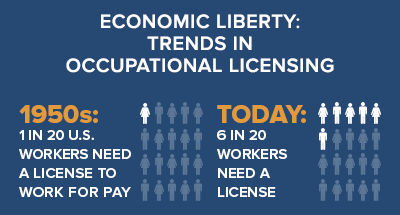On September 24, 2018, the Economic Liberty Task Force released its Options to Enhance Occupational License Portability report.
Nearly thirty percent of American jobs require a license today, up from less than five percent in the 1950s. For some professions, licensing is necessary to protect the public against legitimate health and safety concerns. But many more occupations could be practiced safely and effectively with fewer, or no, licensing requirements.
In many situations, the expansion of occupational licensing threatens economic liberty. Unnecessary licensing restrictions erect significant barriers and impose costs that cause real harm to American workers, employers, consumers, and our economy as a whole, with no measurable benefits to consumers or society. These restrictions can:
- close the door on job opportunities for people who are ready to work;
- prevent workers from marketing their skills to employers and consumers;
- reduce entrepreneurship and business innovation, insulating current service providers from new forms of competition; and
- stifle price, quality, and service competition among professionals, which hurts all consumers.
 Based on recent studies, the burdens of excessive occupational licensing – especially for entry- and mid-level jobs – may fall disproportionately on our nation’s most economically disadvantaged citizens. Even in professions in which licensing makes sense, harm often arises from the complexity and duplication of state-by-state licensing requirements and fees, combined with a lack of reciprocity among states. Unnecessary licensing requirements hit military families particularly hard; these families move often, which means military spouses often must find jobs in new states that have new and different licensing requirements.
Based on recent studies, the burdens of excessive occupational licensing – especially for entry- and mid-level jobs – may fall disproportionately on our nation’s most economically disadvantaged citizens. Even in professions in which licensing makes sense, harm often arises from the complexity and duplication of state-by-state licensing requirements and fees, combined with a lack of reciprocity among states. Unnecessary licensing requirements hit military families particularly hard; these families move often, which means military spouses often must find jobs in new states that have new and different licensing requirements.
An alternative policy approach would rely on competition in the marketplace to protect the public against unqualified service providers. Voluntary certification or other mechanisms offer less restrictive alternatives that might be useful to some employers and consumers as they compare their options.
The FTC’s Economic Liberty Task Force looks forward to working with our state partners and other interested stakeholders as we bring greater attention to these important issues. Occupational licensing reform is good for competition, workers, consumers, and the American economy.
- Learn more about the FTC's advocacy on licensing issues in various occupations.
- Learn more about state-based occupational licensing reform initiatives.
The competitive process not only drives our economy, it provides greater access, choice, quality, and other benefits for consumers. . . . I am particularly concerned that occupational licensing disproportionally affects those seeking to move up the lower and middle rungs of the economic ladder, as well as military families and veterans. Occupational licensing regulations can prevent individuals from using their vocational skills and entering new professions, as well as starting small businesses or creating new business models.”
FTC Acting Chairman Maureen K. Ohlhausen, “Advancing Economic Liberty,” Remarks at the George Mason Law Review’s 20th Annual Antitrust Symposium, February 23, 2017
Contact Us
Share your ideas with the FTC’s Economic Liberty Task Force! For example, we welcome your ideas on:
- State-based efforts to review and reform occupational licensing
- Experts to consult
- Studies to review
- Professions undergoing changes in their approach to licensing
- Interstate compacts, reciprocity, and related efforts
